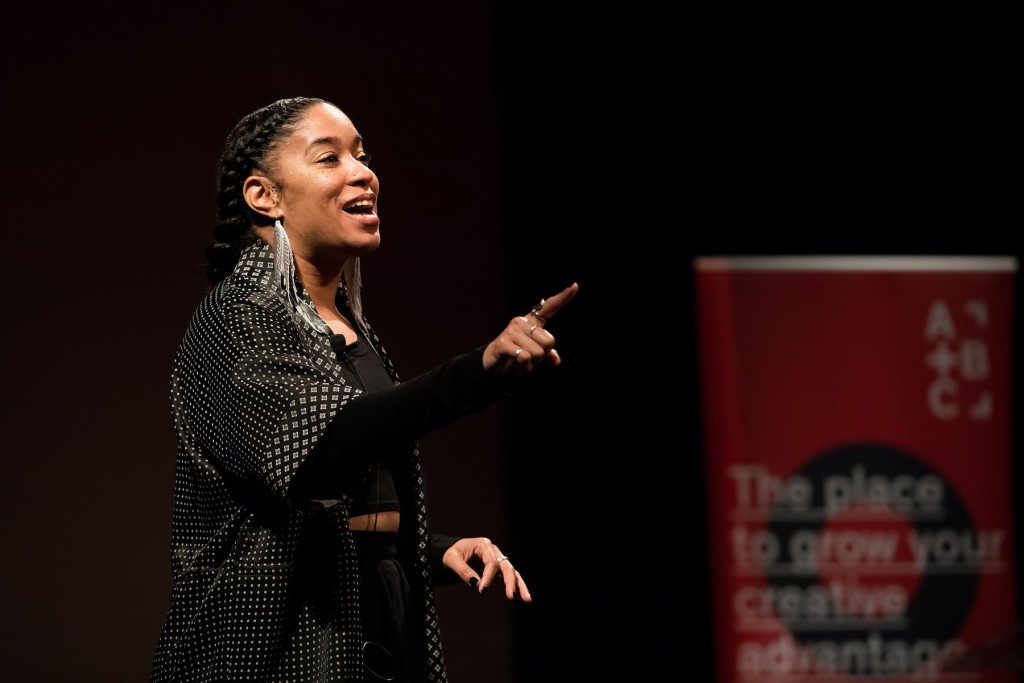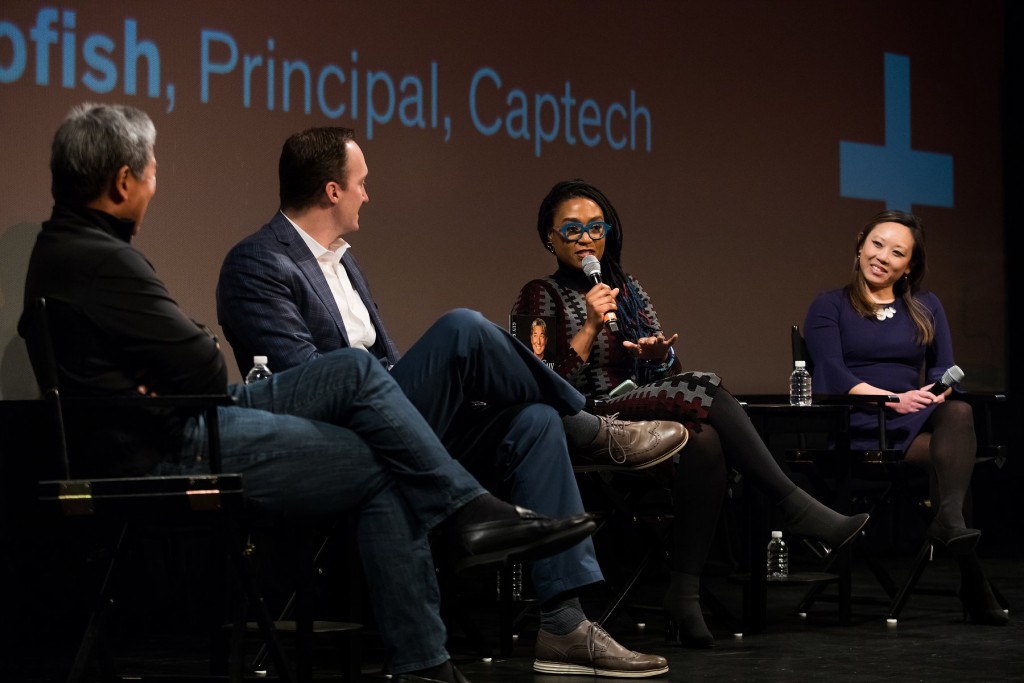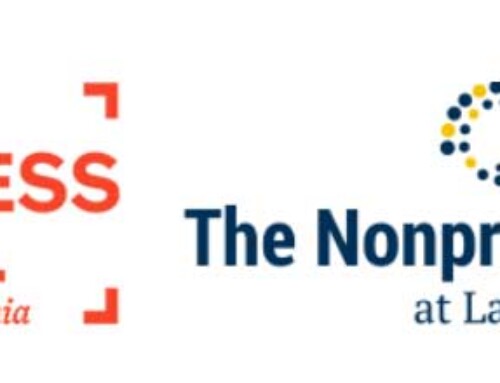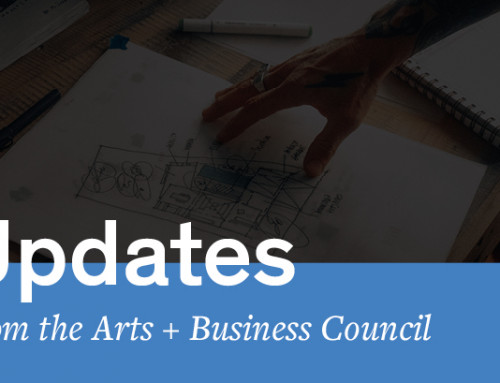On Wednesday, March 13, 2019, the Arts + Business Council, a Council of the Chamber of Commerce for Greater Philadelphia hosted tech investor, author, and brand evangelist, Guy Kawasaki. Over the course of his career, Kawasaki has held key positions at Apple — including working directly with Steve Jobs on the original Macintosh — and Google, rocked the venture capital world with investments in companies like Pandora. Kawasaki is currently the chief evangelist at Australian unicorn, Canva, and brand ambassador to Mercedes-Benz USA.

“Make eye contact with a complete stranger. Communicate your goals without speaking. If you feel discomfort, that’s great! This person is now holding a part of your humanity. Find this person afterwards, make a connection with them.” – Shavon Norris #DefiningInnovation
— Arts + Biz Council (@ArtsBusinessPHL) March 13, 2019
Shavon Norris, an artist, educator, and facilitator, opened the program with an interactive Arts Experience focused on the concept of “mindful making,” a practice that is designed “to deepen the relationship to intuition, awareness of the subtle, and what is outside of direct focus.”
She asked attendees to set goals and objectives for what they hoped to discover not only in regards to the tactical and practical advice they were looking forward to hearing from Guy, but also for what they hoped to discover within themselves.
“Take a breath in and out. Set a desire, goal, or objective for yourself. How do you want to feel? What do you want to accomplish? Maybe you want to make a connection. Stay open,” Norris encouraged the audience.
She then encouraged attendees to welcome feelings of discomfort as they connected with their inward selves, and then asked them to push that discomfort even farther in an exercise that required them to connect with the strangers around them. The task? Communicating silently with prolonged eye contact.
The message Norris communicated through these exercises was that making meaningful connections with others should rely less on talking to exchange ideas and more on non-verbal cues and connecting with others on a human level. She placed an emphasis on being intentional when engaging with ourselves and with each other. The overarching theme was compassion towards our own humanity as we adventure in and out of ourselves.
Next, Kawasaki took to the stage for his keynote address where he shared his life story and the lessons he learned along the way. He gave credit to all of the people who had an impact on his life growing up, particularly those who challenged him. Many of Kawasaki’s grade school teachers, mentors, and coaches encouraged him to never take the easy way out. Kawasaki’s father was the one to tell him to never “look for a problem where there isn’t one,” to essentially choose his battles wisely. Finally, it was Steve Jobs, who taught Kawasaki that nothing matters more than competence in the tech world and beyond. Jobs even led by example by employing a team of direct reports that was entirely women.
Many more lessons from Kawasaki’s story can be found in his newly released memoir, Wise Guy: Lessons from a Life, a book he endearingly refers to as “miso soup for the soul.” In it, Kawasaki covers everything from moral values to business skills to parenting. He writes, “I hope my stories help you live a more joyous, productive, and meaningful life. If Wise Guy succeeds at this, then that’s the best story of all.” Read the reviews.
In the 1980s tech world working for Steve Jobs was tough, but it was an even playing field. These were his direct reports. Competence was the only thing that mattered. @GuyKawasaki #defininginnovation #BalanceforBetter pic.twitter.com/DwIccnTnzo
— Vault Communications (@VaultComm) March 13, 2019
After Kawasaki wrapped up his keynote, Dr. Stephen Klasko, President and CEO, Thomas Jefferson University & Jefferson Health, joined him on stage for an interview. Kawasaki and Klasko talked innovation, specifically in relation to Klasko’s wheelhouse, health care, and why innovation in health care has been relatively stagnant in relation to other fields.
Klasko asked, “While everyone was thinking incrementally, you all at Apple were 10 years ahead. … Why hasn’t that happened in health care?” Kawasaki’s response: “Great innovation always occurs on the next curve, we need to get to the next curve in health care.” Kawasaki encouraged innovators in health care to continue generating new ideas and products until something sticks, a tactic he doesn’t see occurring in the field.

“I’ve never heard of a company that died because they innovated too much.”
— Guy Kawasaki
Finally, as Klasko exited the stage, Kawasaki was joined by the Strategy Salon, a panel of fellow innovators that included Rakia Reynolds, Founder and CEO, Skai Blue Media; Lindsay Mack, Director, Product Management, Comcast NBCUniversal; and Andy Sofish, Principal, Captech, who moderated the discussion. Continuing to follow the thread of discussion – inspiring innovation across every field – the panel focused on ways to drive new ideas and commit to follow-through.
Kawasaki suggested that innovators must see their ideas and projects through to the end: “Instead of trying to find the next pasture that is greener, stay in the pasture you’re in & make it greener.” This means allowing ideas to flourish, a thought that Mack added to by explaining that establishing a culture where feedback and communication are welcomed allows for more opportunity for entire organizations to grow: “When thinking about a culture of innovation… create a safe culture of feedback. Give junior developers opportunities, look at their new ideas and help them develop those ideas.”

Reynolds also pushed the for the idea of authenticity when it comes to the journey of innovation, and the stories that are told to sell products, saying “Storytelling and ‘story selling’ are important [in regards to brand evangelism and product advocacy] … but human connection matters. People pick up on trust, transparency, and honesty.”
View gallery photos of Defining Innovation Presents Guy Kawasaki.











Leave A Comment